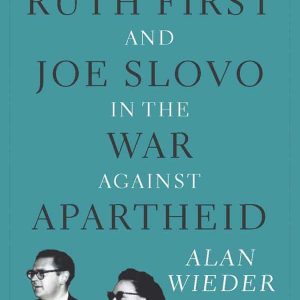Revolutionary Lives in the Making of New South Africa
The Washington Socialist <> January 2014
By Carolyn M. Byerly
Review of Ruth First and Joe Slovo in the War Against Apartheid, by Alan Wieder, Monthly Review Press, 2013.
As the world was saying goodbye to Nelson Mandela in early December, I had my nose in Alan Wieder’s well-researched new biography Ruth First and Joe Slovo in the War Against Apartheid (Monthly Review, 2013). First, Slovo and Mandela were part of an ensemble of revolutionary comrades who together reshaped South Africa from the 1950s to the end of apartheid in 1991. The book is full of these and other familiar characters in a level of detail that would impress the most ardent Talmudic scholar. Wieder’s research involved hours and hours of interviews and immersing himself in court records, other documents and the personal papers of Slovo, First and others from the apartheid era.
This article – a summary more than a critique – has the goal of drawing a profile of revolutionary lives that were fully committed but also full of contradictions, interesting but also mundane in many ways. Because their lives individually and jointly tell the story of apartheid and its liberation, it is impossible to separate the “personal and political” of these two remarkable historical figures.
Ruth First (http://www.sahistory.org.za/people/ruth-herloise-first), a journalist who was assassinated by the South African security forces with a mail bomb in 1982, made her mark reporting on the atrocities of the apartheid government for the Guardian and other left-leaning newspapers, beginning in the mid-1950s. Joe Slovo (http://www.sahistory.org.za/people/joe-slovo), a lawyer, made his mark challenging the regime by legally defending poor black Africans against everything from petty crimes to more serious allegations. He died of leukemia in 1995 while serving as the minister of housing in Mandela’s government.
The husband and wife political team came to their radical inclinations quite differently. First was born in South Africa of Jewish socialist parents who had immigrated to South Africa from Lithuania and Latvia to escape persecution. Her father became a small businessman in Johannesburg and did well, allowing Ruth to grow up in middle class surroundings and to intellectually engage in politics. Joe was born in Lithuania of poor Yiddish-speaking, observant Jewish parents. Not long after his family immigrated to South Africa, his mother died, leaving his father to support and raise several young children. They shifted from one boarding house to another, the father working at jobs where he could, but spending time in jail for debts when he had no work…

Comments are closed.